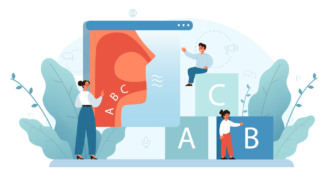LESSON OVERVIEW
In this lesson, students watch a video about cultural appropriation in fashion and learn some vocabulary. The lesson also includes lots of speaking activities for advanced students.
C2 / Proficiency60 minStandard LessonPremium Plan
VIDEO & DISCUSSION
The lesson starts with a warm-up activity in which students read two definitions and need to find words which match them (appropriation, appreciation or apprehension). Then, they read a definition of the term cultural appropriation and think of some examples. If they can’t come up with any, they move on to see the examples in the video. They watch the first part of the video and list the examples of cultural appropriation mentioned in it. Then, they do some speaking activities. They discuss what the difference between cultural appropriation and appreciation is and talk about the examples of cultural appropriation from the video. Then, they watch the second part of the video and need to list examples of cultural appreciation. After the video, students discuss whether cultural appropriation is a big problem and how artists can contribute to the cultures they are inspired by.
VOCABULARY & SPEAKING ACTIVITIES
The final part of the lesson consists of three speaking activities for advanced students. They start with discussing questions related to cultural appropriation. Then, students do a word transformation task. They need to complete gaps with the correct forms of the words in brackets. (e.g. exploit – exploitation, appropriate – appropriating, signify – significance). They also have to decide which of the statements best explain the reasons behind cultural appropriation. Students will use the vocabulary from this task in the last part of the lesson. The last exercise is where students get plenty of speaking practice. They read six scenarios and need to decide whether they are cultural appropriation. The scenarios include examples from different areas, e.g. film, music, eating out. If students decide that the scenarios are not cultural appropriation, they have to discuss in what way the behaviour is fair or unfair.
Subscribe to unlock these and many other Standalone lesson with the Premium planWORKSHEETS













This lesson is extremely necessary due to the world we are living in now. Students must be aware of this topic not only to respect other cultures but also to talk about it with confidence and inspire others. Having these concepts clear is key to building a fair world. The highlight of the lesson for me was the video because it shows diverse faces as they are. Normal people speaking English. I believe ESL Brains lessons should explore more. Diverse people in the picture of the lessons, different sources of videos, accents and etc… It makes students feel comfortable, represented, included, and seen in their English class.
Wonderfully put. I could not agree more.
Thanks, Fernanda! You are absolutely right!
Are you teaching English or evangelising for far-left politics?
Great Lesson, thank you.
Fantastic class – my students loved it!
Thanks! Excited to hear that 🙂
This was such a great way to introduce the topic to students when usually it’s something we would avoid.
Thanks for your feedback, Shruti 🙂
My university students laughed really hard when we did this class together. We’re all based and agree that this is all just ridiculous and absurd 😀